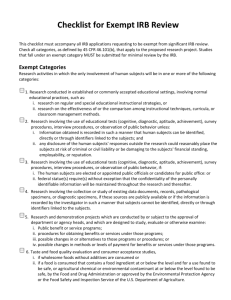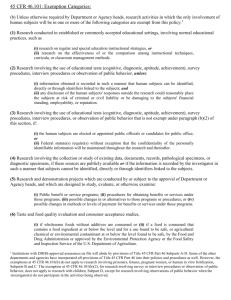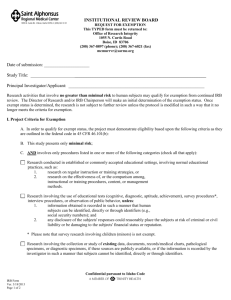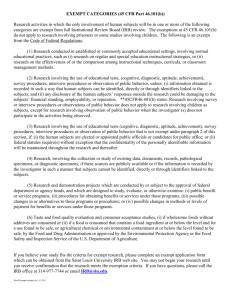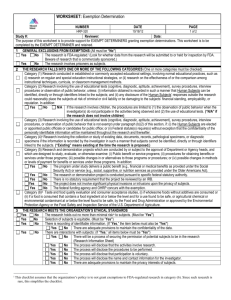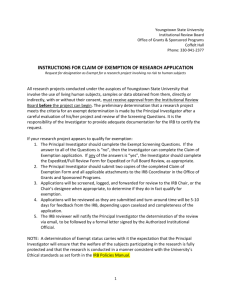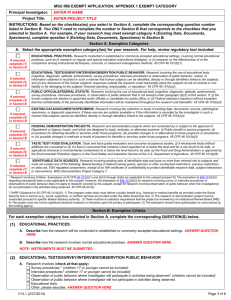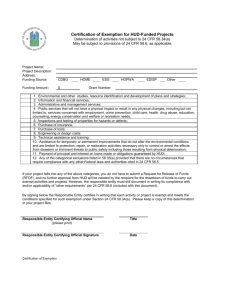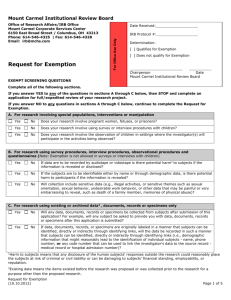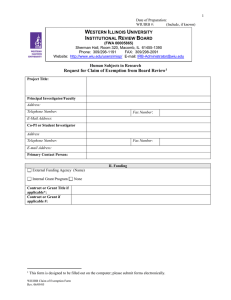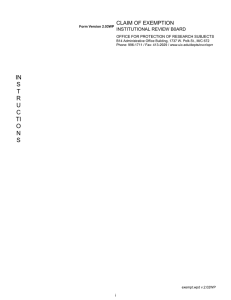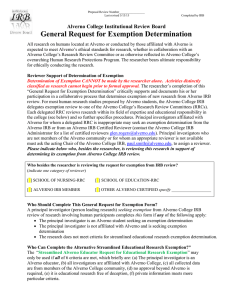Exemption Request form - Texas Department of State Health Services
advertisement
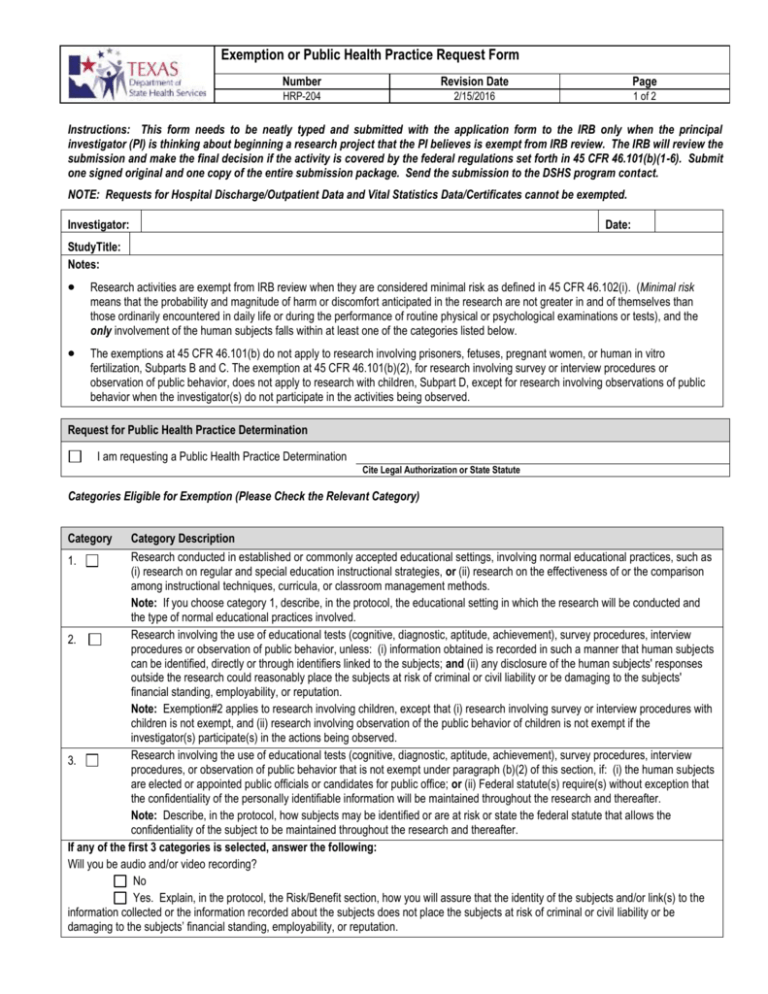
Exemption or Public Health Practice Request Form Number Revision Date Page HRP-204 2/15/2016 1 of 2 Instructions: This form needs to be neatly typed and submitted with the application form to the IRB only when the principal investigator (PI) is thinking about beginning a research project that the PI believes is exempt from IRB review. The IRB will review the submission and make the final decision if the activity is covered by the federal regulations set forth in 45 CFR 46.101(b)(1-6). Submit one signed original and one copy of the entire submission package. Send the submission to the DSHS program contact. NOTE: Requests for Hospital Discharge/Outpatient Data and Vital Statistics Data/Certificates cannot be exempted. Investigator: Date: StudyTitle: Notes: Research activities are exempt from IRB review when they are considered minimal risk as defined in 45 CFR 46.102(i). (Minimal risk means that the probability and magnitude of harm or discomfort anticipated in the research are not greater in and of themselves than those ordinarily encountered in daily life or during the performance of routine physical or psychological examinations or tests), and the only involvement of the human subjects falls within at least one of the categories listed below. The exemptions at 45 CFR 46.101(b) do not apply to research involving prisoners, fetuses, pregnant women, or human in vitro fertilization, Subparts B and C. The exemption at 45 CFR 46.101(b)(2), for research involving survey or interview procedures or observation of public behavior, does not apply to research with children, Subpart D, except for research involving observations of public behavior when the investigator(s) do not participate in the activities being observed. Request for Public Health Practice Determination I am requesting a Public Health Practice Determination Cite Legal Authorization or State Statute Categories Eligible for Exemption (Please Check the Relevant Category) Category Category Description Research conducted in established or commonly accepted educational settings, involving normal educational practices, such as (i) research on regular and special education instructional strategies, or (ii) research on the effectiveness of or the comparison among instructional techniques, curricula, or classroom management methods. Note: If you choose category 1, describe, in the protocol, the educational setting in which the research will be conducted and the type of normal educational practices involved. Research involving the use of educational tests (cognitive, diagnostic, aptitude, achievement), survey procedures, interview 2. procedures or observation of public behavior, unless: (i) information obtained is recorded in such a manner that human subjects can be identified, directly or through identifiers linked to the subjects; and (ii) any disclosure of the human subjects' responses outside the research could reasonably place the subjects at risk of criminal or civil liability or be damaging to the subjects' financial standing, employability, or reputation. Note: Exemption#2 applies to research involving children, except that (i) research involving survey or interview procedures with children is not exempt, and (ii) research involving observation of the public behavior of children is not exempt if the investigator(s) participate(s) in the actions being observed. Research involving the use of educational tests (cognitive, diagnostic, aptitude, achievement), survey procedures, interview 3. procedures, or observation of public behavior that is not exempt under paragraph (b)(2) of this section, if: (i) the human subjects are elected or appointed public officials or candidates for public office; or (ii) Federal statute(s) require(s) without exception that the confidentiality of the personally identifiable information will be maintained throughout the research and thereafter. Note: Describe, in the protocol, how subjects may be identified or are at risk or state the federal statute that allows the confidentiality of the subject to be maintained throughout the research and thereafter. If any of the first 3 categories is selected, answer the following: Will you be audio and/or video recording? No Yes. Explain, in the protocol, the Risk/Benefit section, how you will assure that the identity of the subjects and/or link(s) to the information collected or the information recorded about the subjects does not place the subjects at risk of criminal or civil liability or be damaging to the subjects’ financial standing, employability, or reputation. 1. Exemption or Public Health Practice Request Form 4. Number Revision Date Page HRP-204 2/15/2016 2 of 2 Research involving the collection or study of existing data, documents, records, pathological specimens, or diagnostic specimens, if these sources are publicly available or if the information is recorded by the investigator in such a manner that subjects cannot be identified, directly or through identifiers linked to the subjects. Note: To qualify for this exemption, the data, documents, records, or specimens must be in existence before the project begins. In addition, under this exemption, an investigator (with proper authorization) may inspect identifiable records, but may only record information in a non-identifiable manner. 5. Not Available Research and demonstration projects which are conducted by or subject to the approval of Department or Agency heads, and which are designed to study, evaluate, or otherwise examine: (i) Public benefit or service programs; (ii) procedures for obtaining benefits or services under those programs; (iii) possible changes in or alternatives to those programs or procedures; or (iv) possible changes in methods or levels of payment for benefits or services under those programs. Note: Exemption #5 applies only to research and demonstration projects studying federal programs and its use must be authorized by the Federal Agency supporting the research. As with all exemptions, IRBs and institutions retain the authority not to invoke the exemption, even if so authorized by the relevant Federal Agency. Studies of state and local public service programs require IRB review. Waiver of informed consent is possible for such programs under 45 CFR 46.116(c). 6. Taste and food quality evaluation and consumer acceptance studies, (i) if wholesome foods without additives are consumed or (ii) if a food is consumed that contains a food ingredient at or below the level and for a use found to be safe, or agricultural chemical or environmental contaminant at or below the level found to be safe, by the Food and Drug Administration or approved by the Environmental Protection Agency or the Food Safety and Inspection Service of the U.S. Department of Agriculture. Signature of Investigator Date
